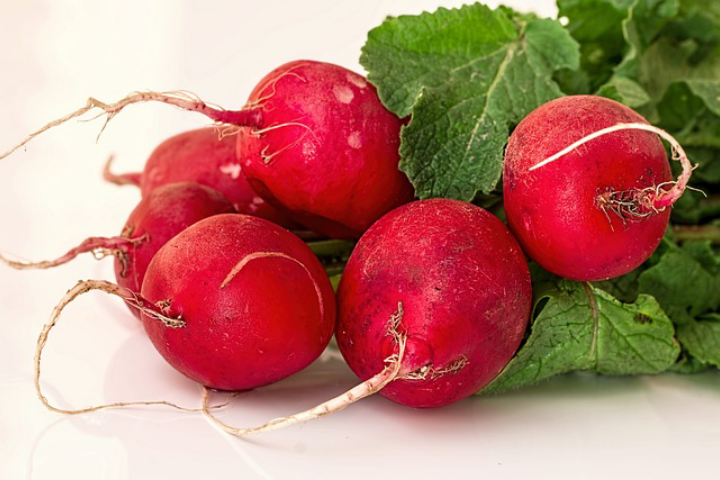
Radishes are a root vegetable that is high in vitamin C, potassium, and fiber. They are also a good source of magnesium, phosphorus, and B vitamins. Radishes are a natural detoxifier and can be helpful in cleansing the liver and kidneys. They are also a good source of antioxidants and may help to protect against cancer.
Radish nutrition
There are numerous nutrients found in radishes, including potassium, magnesium, calcium, and vitamins C and A. All of these nutrients work together to provide numerous health benefits. Potassium is an important mineral for maintaining blood pressure and heart health, while magnesium is beneficial for muscle and nerve function. Calcium is necessary for strong bones and teeth, and vitamin C is a powerful antioxidant that can help fight off infection. Vitamin A is important for vision health, reproduction, and cell growth.
Radish Benefits
There are many potential health benefits of radishes, including improved cardiovascular health, reduced inflammation, and better digestion. Additionally, radishes are a good source of antioxidants, which can help protect the body against free radical damage. Some health benefits of radish include:
1. Radishes are a good source of vitamin C, providing about 15 percent of the recommended daily intake in a one cup serving. Vitamin C is a water soluble vitamin that is important for maintaining the health of your immune system. It is also necessary for the formation of collagen, a protein that helps to maintain the integrity of your skin and other connective tissues.
2. Radishes are a good source of dietary fiber, providing about three grams in a one cup serving. Fiber is important for maintaining regularity and promoting digestive health. Additionally, fiber may help to reduce your risk of developing heart disease or certain types of cancer.
3. Radishes are a low calorie food, providing only about 16 calories in a one cup serving. This makes them a good choice if you are trying to lose weight or manage your weight.
4. Radishes are a good source of folate, providing about 12 percent of the recommended daily intake in a one cup serving. Folate is important for pregnant women because it helps to prevent birth defects in the baby. It is also essential for maintaining the health of your nervous system.
5. Radishes are a good source of potassium, providing about 290 milligrams in a one cup serving. Potassium is an important mineral that helps to regulate blood pressure and heart function. It may also help to reduce the risk of developing kidney stones.
6. Radishes are a good source of magnesium, providing about six percent of the recommended daily intake in a one cup serving. Magnesium is important for muscle function and energy production. It may also help to reduce the risk of developing heart disease or diabetes.
7. Radishes are rich in antioxidants, which can help to protect your cells from damage caused by free radicals. This may reduce your risk of developing cancer or other chronic diseases.
8. Radishes may help to improve blood sugar control and reduce insulin resistance in people with type 2 diabetes.
9. Radishes are an excellent source of vitamin B6, providing about 20 percent of the recommended daily intake in a one cup serving. Vitamin B6 is important for maintaining healthy skin, hair, and nails, and for producing energy from food sources. It is also essential for proper brain function
Radish juice
There are many benefits of radish juice, including its ability to detoxify the body, improve digestion, boost the immune system, and improve cardiovascular health.
How to prepare radish juice
To prepare the juice, first wash the radishes and trim off the greens. Cut the radishes into quarters and then place them in a juicer. Juice the radishes and then pour the juice into a glass. Serve immediately.
A cruciferous vegetable related to cabbage and broccoli, radishes are grown for their edible tuberous root. Radish plants are low in calories and a good source of vitamin C and potassium. The edible roots can be eaten raw or cooked.


- Watermelon Seeds as a Natural Remedy for High Blood Pressure- Better Cardiovascular Health HubHigh blood pressure, also known as hypertension, is a growing concern globally due to its association with various health complications. While there are pharmaceutical treatments..
- Meditation and Yoga for Arthritis Pain: 20 Practices to Try – Better Holistic Medicine
- Ensuring you get enough sleep is crucial for maintaining your overall health. Learn why sleep is important and how you can improve your sleep habits. – Better Holistic HealthSleep is one of the most essential aspects of maintaining a healthy lifestyle. From improving your memory and focus to regulating your mood and immune..
- Have you ever wondered what the difference is between a balanced diet and a crash diet – Better Holistic HealthWhen it comes to losing weight and maintaining a healthy lifestyle, people often turn to various diets to achieve their goals. However, there is a..
- Did you know that stress is one of the leading causes of weight gain? Learn how to manage stress and maintain a healthy weight with these tips – Better Holistic HealthStress has become a common part of our lives today, with most of us experiencing it in one form or another. Whether it’s work-related stress,..